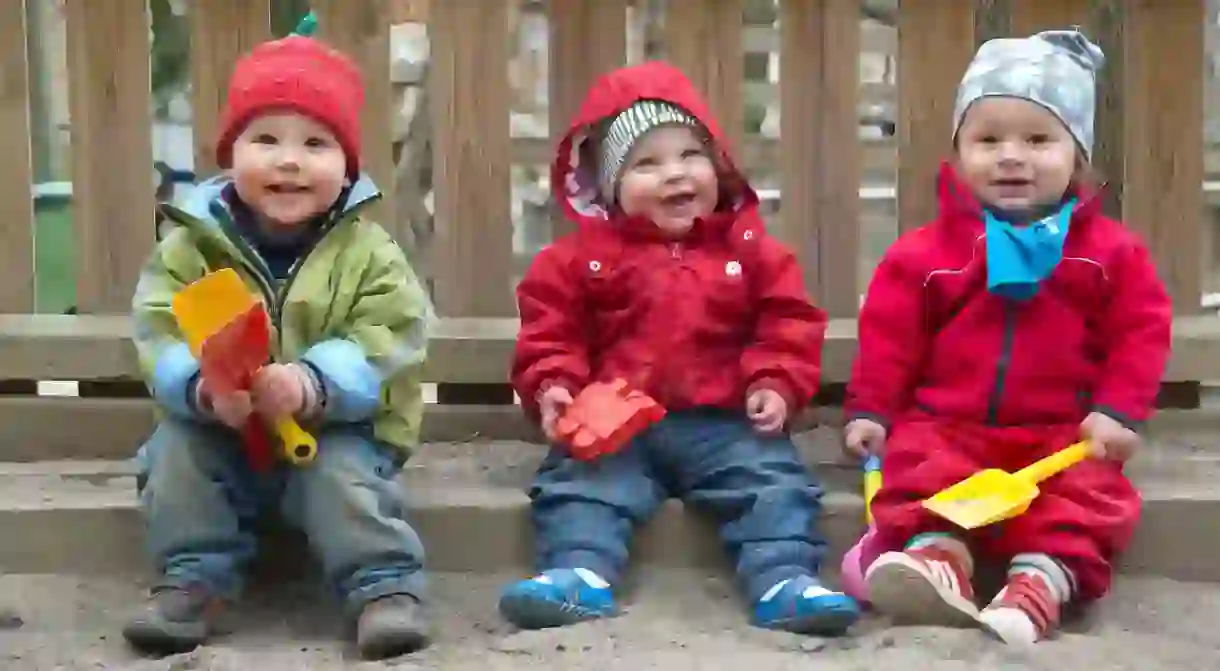12 Truths About Growing up in Sweden

Sweden regularly tops global lists as the best place to bring up kids, but what’s it like growing up here, and what common experiences do most Swedish kids share? Here are 12 truths about growing up in Sweden that might just surprise you.
Birthday mornings
Have you ever woken up on your birthday and thought, ‘I don’t really feel like waiting until tonight for some cake and presents’? Well, if you grew up in Sweden you wouldn’t have to, because on your birthday in Sweden you stay in bed, excitedly waiting for the family to come pouring into your room bearing gifts and a cake ablaze with candles. Then you open all your presents, gorge yourself on some cake and eventually head off to school or wherever else you have to be. Not a bad way to start your special day, eh?

Name Day
Name day (namnsdag) is another great Swedish tradition, where you get presents (often money) just for having your special name. Names are listed in all calendars, so there’s no chance anyone will be missed – and if your name isn’t on the official name day list? Your parents were probably savvy enough to give you a second or middle name that is on the list, so you won’t miss out.

No smacking
Any kid born after 1979 will have no memory of being smacked, spanked or otherwise hit, because that’s when the Swedish government outlawed all corporate punishment of children. Instead, Swedish children are reasoned with and, in dire circumstances, experience the patented ‘Swedish arm pull’, which is just shy of hitting.

Daycare mates for life
When Swedish kids go to to daycare (dagis) they often make at least one or two friends that they will keep for the rest of their lives. Daycares feed into schools, so from the age of around one to around 16 or 17, the kids spend all their time with the same kids, forging incredibly strong bonds over shared experiences. It’s quite sweet to hear old people talk about a friend they’ve known since they were both in diapers.

Astrid Lindgren
Whether it’s Pippi Longstocking (Pippi Longstrump in Swedish), The Brothers Lionheart, Emil or even Karlsson on the Roof, nearly every Swedish kid has read or been read a slew of Astrid Lindgren books. She’s a true national treasure, and her stories continue to delight generation after generation of Swedish children.

Sports holidays
In Sweden there is something called sportlov, which is a week-long holiday around the end of February that is meant to be a sport break for the entire family. Many people head to the slopes for some skiing, although these days it’s increasingly popular to take a sunnier break somewhere like Thailand or the Canary Islands. The practice stems from fuel rationing during World War II, when it was necessary to close schools for a week in order to save on fuel. Now it’s a time for kids to spend time with their hardworking parents, and for everyone to get a break.

Fredagsmys
Every Friday, families up and down the country gather in front of the television to watch movies and eat loads of crisps, soda and pizza. It’s called Fredagsmys (‘cosy Friday’) and it’s almost universally practised. While the kids load up on the snacks, parents take the time to down a few (or more) glasses of wine, safe in the knowledge that as long as the junk food is present the kids aren’t going anywhere.

No advertising
While enjoying Fredagsmys, families may opt to watch a children’s film or some other family-friendly fare, and when they do, they’ll see absolutely no advertising aimed at children. Why? Because it’s banned by the Swedish government, which explains why when Swedes go to other countries and flip on the telly they’re shocked at the amount of advertising tempting children with products they don’t need.

Lördagsgodis
Once the Friday junk food festival is over, it’s time for lördagsgodis, also known as ‘Saturday candy’. This is traditionally the day on which children are allowed to eat sweets, and their favourite thing is to go to the local grocery store’s pick-n-mix and fill up a bag with their favourite cavity creator. Basically, weekends in Sweden are all about eating things that are bad for you.

Outdoor life
Luckily, Swedish children spend a lot of time outdoors burning off all that junk food, whether it’s playing organised sports, stomping through the woods or bopping around one of the endless playgrounds that are found in every town and city, no matter how big or small. When we say ‘a lot’ we really mean ‘a lot’. The average Swedish kid spends more than four hours a day outside, which isn’t really a surprise when you remember how much Swedes love nature and the great outdoors.

Student pay
Once a Swedish kid turns 16, their parents no longer get a child allowance. Instead, that money is transferred to the child, who gets a monthly stipend called student bidrag. They continue to receive this money, which is just over 1,000 Swedish kronor (US$120), for as long as they stay in school. Along with getting their monthly stipend, this is often when Swedish kids get their first credit card, which is attached to their parent’s bank account until they reach the age of majority.

Christmas pageants
Lucia is a big thing in Sweden. It’s more than big, actually. It’s one of the biggest events on the Swedish calendar, and every single school in the country has a Lucia pageant at Christmas, with songs, concerts and loads of cakes and cookies. Some have good memories of Lucia, some have bad, but everyone has a Lucia memory.














